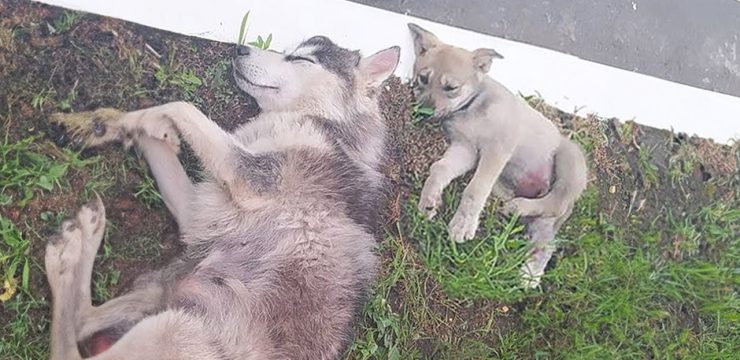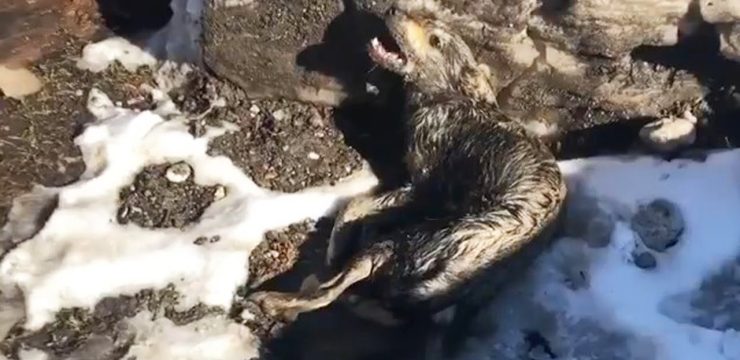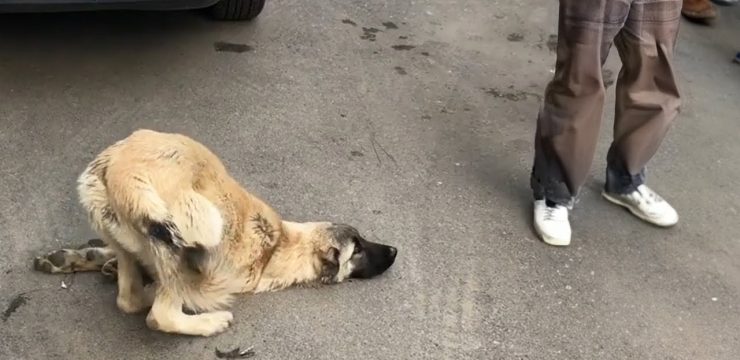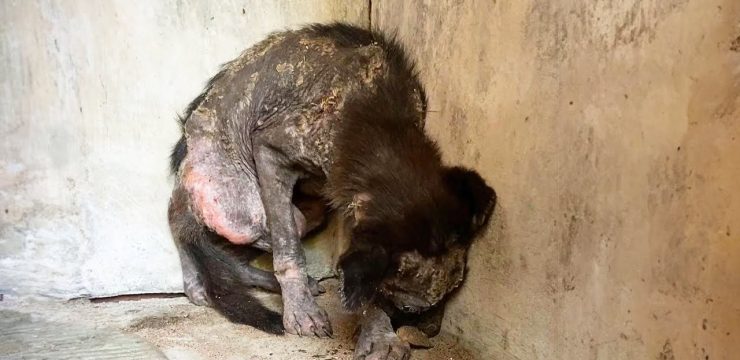For some time now, I had been visiting the local hospital with my therapy dog, Riley. Our mission was simple yet meaningful: to bring a little bit of light, comfort, and joy to patients going through some of the toughest times in their lives. Riley, a gentle golden retriever with soft, understanding eyes, had a natural gift for sensing who needed him the most. Week after week, we walked through the long hospital corridors, stopping by rooms where patients smiled, cried, or simply held Riley close for a while, finding a sense of peace in his calm presence.
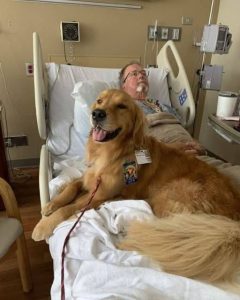
One afternoon, as we made our rounds, we were directed to a quieter wing of the hospital, a section that housed long-term patients. There, we entered a dimly lit room where Mr. Callahan lay silently in bed. According to the nurses, he hadn’t spoken a word in months. His health was fragile, and his spirit seemed even more so. He was an elderly man with thinning white hair and a frail frame, tucked beneath sterile white sheets. The atmosphere in the room was heavy, and it felt as if sadness itself had taken residence there.
As gently as possible, I encouraged Riley to hop up onto Mr. Callahan’s bed. At first, there was no reaction. Riley settled quietly next to him, resting his head lightly on the old man’s lap. Minutes passed, and then, almost imperceptibly, Mr. Callahan’s hand moved. He reached out, trembling, and touched Riley’s soft fur. And then, in a raspy, almost forgotten voice, he muttered two simple words: “Good boy.”
I watched in awe, but it didn’t stop there. After a few moments, Mr. Callahan whispered again, this time saying a name: “Marigold.” The way he said it, so full of tenderness and nostalgia, made me realize it wasn’t just a random word. Sensing that there was more behind it, I gently asked him about Marigold. With Riley still snuggled beside him, Mr. Callahan’s eyes softened, and he began to speak, slowly at first, then with growing strength.
He told us that Marigolds were his late wife Eleanor’s favorite flowers. Every birthday, anniversary, or just because, she would bring him a small bouquet of bright, cheerful marigolds. They were more than just flowers; they were a symbol of her love, her optimism, and the life they had built together. Mr. Callahan shared stories of their simple but beautiful life—picnics in the park, dancing in the kitchen, evenings spent reading side by side. It was clear that Eleanor had been the love of his life, his anchor.
Two years earlier, Eleanor had passed away after a long battle with illness. Since then, Mr. Callahan said he had found it increasingly difficult to care about anything at all. The vibrant world they had shared seemed to lose all its color without her. Speaking, eating, even getting out of bed had become monumental tasks. Eventually, he had simply stopped trying. The sadness had weighed him down so heavily that he had retreated completely into himself, unwilling and unable to find a reason to engage with the world.
But somehow, Riley’s presence had pierced through that heavy fog. It wasn’t just the softness of his fur or the warmth of his body; it was the unconditional, nonjudgmental love he offered, the same kind of love Mr. Callahan had once known so well. As we sat there, Mr. Callahan’s voice grew stronger, and for the first time in a very long while, he asked for something: he wanted to go outside.
With help from the nurses, we wheeled Mr. Callahan down the hall, through the lobby, and into the hospital’s small garden. It was a sunny afternoon, with a light breeze that carried the scent of blooming flowers through the air. As we approached one corner of the garden, Mr. Callahan gasped softly. There, in a small patch by the walkway, marigolds were growing—bright, golden, and alive. He reached out with a trembling hand and touched the delicate petals. Tears filled his eyes and spilled down his weathered cheeks.
In that moment, it wasn’t just about touching the flowers; it was about reconnecting with everything those marigolds represented. Love, memories, hope, and the eternal bond between two people who had shared a lifetime. Through Riley’s visit, Mr. Callahan found a way to unlock emotions and memories he had buried under layers of grief. The healing that took place that day wasn’t something that could be measured in vital signs or medical charts. It was the kind of healing that happened deep within the soul, the kind that reawakens a person’s will to live, to feel, and to remember.
As we sat together in the garden—an old man, a therapy dog, and a volunteer—it became clear that moments like these are what make all the difference. Riley hadn’t just helped Mr. Callahan speak again; he had helped him feel again. In a world where medicine can mend bodies but often struggles to mend broken hearts, sometimes all it takes is a warm presence and an open heart to make miracles happen.
I will never forget that day, or the lesson Mr. Callahan taught me without even realizing it. Healing isn’t always loud or dramatic. Sometimes it’s a soft murmur, a touch of petals, a shared memory whispered into the wind. It’s the quiet moments of connection that remind us we are never truly alone, that love outlasts even the deepest sorrow, and that sometimes, hope can be found in the most unexpected places—like a garden patch of marigolds, or the gentle nuzzle of a therapy dog who simply knows when someone needs him most.
